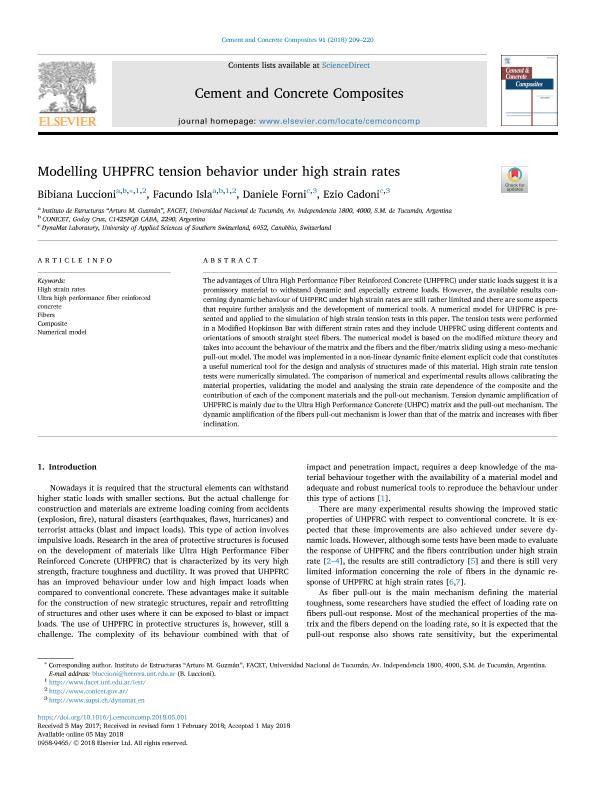Mostrar el registro sencillo del ítem
dc.contributor.author
Luccioni, Bibiana Maria

dc.contributor.author
Isla, Facundo
dc.contributor.author
Forni, Daniele
dc.contributor.author
Cadoni, Ezio
dc.date.available
2019-10-23T13:33:25Z
dc.date.issued
2018-05
dc.identifier.citation
Luccioni, Bibiana Maria; Isla, Facundo; Forni, Daniele; Cadoni, Ezio; Modelling UHPFRC tension behavior under high strain rates; Elsevier; Cement & Concrete Composites; 91; 5-2018; 209-220
dc.identifier.issn
0958-9465
dc.identifier.uri
http://hdl.handle.net/11336/87064
dc.description.abstract
The advantages of Ultra High Performance Fiber Reinforcd Concrete (UHPFRC) under static loads suggest it is a promissory material to withstand dynamic and especially extreme loads. However, the available results concerning dynamic behaviour of UHPFRC under high strain rates are still rather limited and there are some aspects that require further analysis and the development of numerical tools. A numerical model for UHPFRC is presented and applied to the simulation of high strain tension tests in this paper. The tension tests were performed in a Modified Hopkinson Bar with different strain rates and they include UHPFRC using different contents and orientations of smooth straight steel fibers. The numerical model is based on the modified mixture theory and takes into account the behaviour of the matrix and the fibers and the fiber/matrix sliding using a meso-mechanic pull-out model. The model was implemented in a non-linear dynamic finite element explicit code that constitutes a useful numerical tool for the design and analysis of structures made of this material. High strain rate tension tests were numerically simulated. The comparison of numerical and experimental results allows calibrating the material properties, validating the model and analysing the strain rate dependence of the composite and the contribution of each of the component materials and the pull-out mechanism. Tension dynamic amplification of UHPFRC is mainly due to the Ultra High Performance Concrete (UHPC) matrix and the pull-out mechanism. The dynamic amplification of the fibers pull-out mechanism is lower than that of the matrix and increases with fiber inclination.
dc.format
application/pdf
dc.language.iso
eng
dc.publisher
Elsevier

dc.rights
info:eu-repo/semantics/openAccess
dc.rights.uri
https://creativecommons.org/licenses/by-nc-sa/2.5/ar/
dc.subject
HIGH STRAIN RATES
dc.subject
ULTRA HIGH PERFORMANCE FIBER REINFORCED CONCRETE
dc.subject
FIBERS
dc.subject
COMPOSITE
dc.subject
NUMERICAL MODEL
dc.subject.classification
Ingeniería Civil

dc.subject.classification
Ingeniería Civil

dc.subject.classification
INGENIERÍAS Y TECNOLOGÍAS

dc.title
Modelling UHPFRC tension behavior under high strain rates
dc.type
info:eu-repo/semantics/article
dc.type
info:ar-repo/semantics/artículo
dc.type
info:eu-repo/semantics/publishedVersion
dc.date.updated
2019-10-22T17:24:58Z
dc.journal.volume
91
dc.journal.pagination
209-220
dc.journal.pais
Países Bajos

dc.journal.ciudad
Amsterdam
dc.description.fil
Fil: Luccioni, Bibiana Maria. Universidad Nacional de Tucumán. Facultad de Ciencias Exactas y Tecnología. Instituto de Estructuras "Ing. Arturo M. Guzmán"; Argentina. Consejo Nacional de Investigaciones Científicas y Técnicas. Centro Científico Tecnológico Conicet - Tucumán; Argentina
dc.description.fil
Fil: Isla, Facundo. Universidad Nacional de Tucumán. Facultad de Ciencias Exactas y Tecnología. Instituto de Estructuras "Ing. Arturo M. Guzmán"; Argentina
dc.description.fil
Fil: Forni, Daniele. Dynamat Laboratory, Supsi; Suiza
dc.description.fil
Fil: Cadoni, Ezio. Dynamat Laboratory, Supsi; Suiza
dc.journal.title
Cement & Concrete Composites

dc.relation.alternativeid
info:eu-repo/semantics/altIdentifier/url/https://www.sciencedirect.com/science/article/pii/S0958946517304109?via%3Dihub#!
dc.relation.alternativeid
info:eu-repo/semantics/altIdentifier/url/https://doi.org/10.1016/j.cemconcomp.2018.05.001
Archivos asociados
